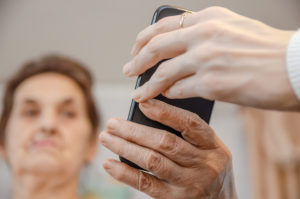Long Distance Caregiving During These Difficult Times

Trying to coordinate long distance caregiving is a challenge for many. Add COVID-19 into the mix, and the situation becomes even more difficult, reports the article “When your parent is far away and you are trying to care for them” from the Pittsburgh Post-Gazette.
If you are in the position of having to care for a loved one long distance, the starting point is to have the person you are caring for give you legal authorization to act on their behalf to make financial and medical decisions for them. A financial power of attorney (known as a Statutory Durable Power of Attorney in Texas) naming you as agent will allow you to help manage your loved one’s financial affairs. It is also important that the person give you a HIPAA Release. HIPAA (Health Insurance Portability and Accountability Act) is the law that governs the use, disclosure and protection of sensitive patient information. With a HIPAA Release you will be able to receive medical information relating to the person you are caring for and to discuss matters with the person’s health care providers.
Next, find out where all of their important documents are, including insurance policies (long-term care, health, life, auto, home), Social Security and Medicare cards. You’ll also want to be able to access tax documents which will provide you with information on retirement accounts, bank accounts and investments. Don’t forget to ask your loved one for family documents, including birth, death, and marriage certificates, which may be necessary to claim benefits. Make copies of these documents so that you can make appropriate decisions for your loved one, even from a long distance.
Ask your family member whether he or she has completed their estate planning, and whether they want to make any changes. You may wish to review with your loved one changes that indicate when an estate plan should be updated. See https://galligan-law.com/when-to-update-your-estate-plan/.
Put all of this information into a binder, so you have access to it easily.
Consider setting up a care plan for your family member to take care of things that come up when you can’t be there. Think about what kind of care do they have in place right now, and what do you anticipate they may need in the near future? There should also be a contingency plan for emergencies, which seem to occur when they are least expected and which make long distance caregiving especially difficult.
A geriatric care manager or a social worker who can do a needs assessment can help coordinate services, including shopping for groceries, administering medication and help with food preparation, bathing and dressing. If possible, develop a list of neighbors, friends or fellow worshippers who might create a local support system that compliments your long distance caregiving.
Keeping in touch is very important. These days, many are doing regular video calls with their family members. Conference calls with caregivers and your loved one is another way keep everyone in touch.
Long distance caregiving is difficult, but a well-thought out plan and preparing for all situations will make your loved one safer.
Reference: Pittsburgh Post-Gazette (Sep. 28, 2020) “When your parent is far away and you are trying to care for them”

